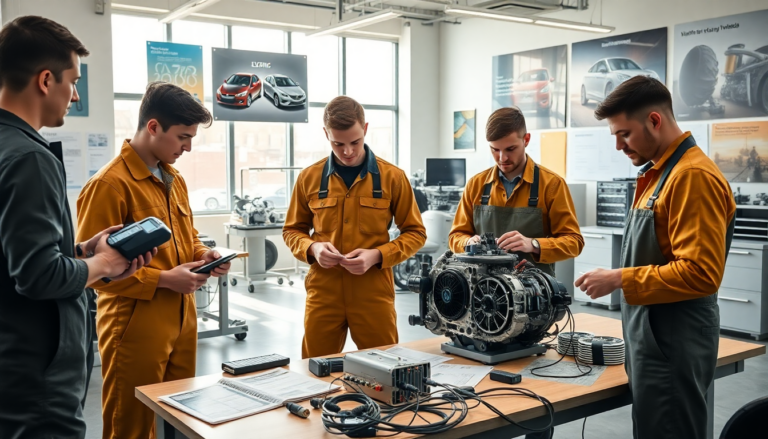Argomenti trattati
As the automotive industry undergoes rapid transformation with the rise of electric and hybrid vehicles, have you ever wondered what this means for the future of automotive technicians? The demand for skilled professionals is soaring, and this is where hands-on training programs come into play. They equip students with the essential skills and experience needed to thrive in this dynamic field. By focusing on practical learning, these programs not only prepare students for immediate employment but also lay the groundwork for long-term career success.
Overview of Automotive Training Programs
Many educational institutions are stepping up to meet the industry’s growing needs by offering cutting-edge training programs. For instance, one notable program boasts a robust curriculum that covers everything from traditional engine systems to advanced electric vehicle technology. This comprehensive approach ensures that students are well-versed in the latest automotive innovations, making them highly attractive to potential employers. But what does this really mean for students? It means they’re getting a head start in a field that’s constantly evolving.
The curriculum typically includes hands-on experience with modern diagnostic tools and equipment, allowing students to work on real vehicles. This practical exposure is invaluable, as it builds confidence and competence—two essential qualities in the fast-paced automotive world. Moreover, partnerships with leading automotive manufacturers provide students with unique opportunities for internships and career paths that can lead to rewarding jobs upon graduation. Isn’t it reassuring to know that students are being prepared for real-world challenges right from the classroom?
Specialized Electric Vehicle Training
With the growing importance of electric vehicles (EVs) and alternative fuel technologies, specialized training programs have emerged to address these trends. These programs focus on high-voltage systems, battery technology, and regenerative braking, among other critical topics. Students learn to navigate the complexities of electric drivetrains and fuel cell technology, preparing them for a market that increasingly prioritizes sustainability. How exciting is it to think about being at the forefront of this automotive revolution?
The investment in state-of-the-art training facilities and equipment reflects the commitment to providing students with the best learning environment possible. Programs often feature modern training vehicles, such as hybrids and hydrogen fuel cell cars, ensuring that students engage with the latest automotive technologies. This hands-on approach not only enhances their technical skills but also fosters a deep understanding of the industry’s direction. It’s all about bridging the gap between theory and practice.
Innovative Learning Models for Automotive Technology
To further adapt to the changing landscape of education, innovative learning models are being introduced. For example, the Competency-Based Education (CBE) Accelerate program offers a self-paced, predominantly online learning experience for automotive technology students. This model prioritizes skills demonstration over traditional classroom time, allowing students to progress at their own pace while still receiving the necessary support and guidance. Doesn’t that sound like a fantastic way to learn?
By offering a flexible schedule, students can balance their education with work or personal commitments more effectively. This approach not only helps them complete their degrees or certifications faster but also reduces the overall cost of their education. Programs under this model typically include a CBE Certificate of Achievement focused on specific automotive systems, as well as an Associate in Science degree in Automotive Technology. What better way to gain a competitive edge in the job market?
Ultimately, students in these programs benefit from a transcript detailing their skills and competencies, which can be a powerful tool when seeking employment. The ability to showcase practical skills to potential employers greatly enhances their job prospects and career advancement opportunities. Isn’t it inspiring to think about how these students are preparing to make their mark in the automotive world?
Conclusion and Future Outlook
As the automotive industry continues to evolve, the importance of practical training and innovative learning models cannot be overstated. Students who engage in hands-on training programs are well-prepared to enter a marketplace that values adaptability, technical expertise, and a commitment to sustainability. With the right education and experience, aspiring automotive professionals can position themselves for successful and fulfilling careers in this exciting field. Are you ready to take the leap into this automotive revolution?

